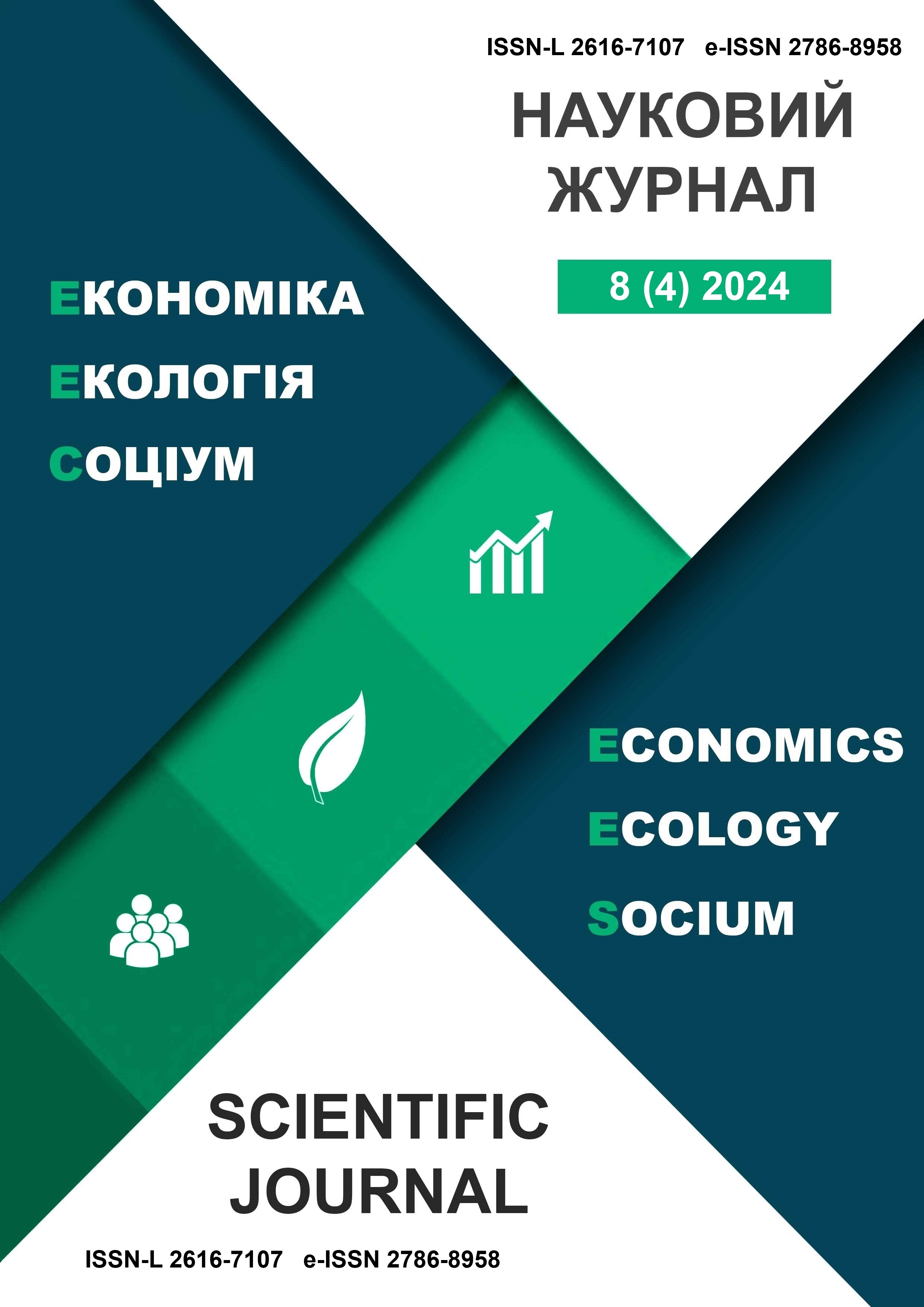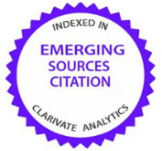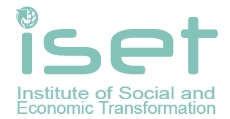Assessing the Effectiveness of the Fiscal Policy Tools in Facilitating Inclusive Economic Growth
Abstract
Introduction. Fiscal policy aims to promote economic growth and ensure inclusive growth in reaching low-income populations and benefit from economic activity. Therefore, fiscal policy instruments should be appropriately chosen to achieve inclusive growth. Maintaining the financial system's stability determines the critical role of fiscal policy, especially given its impact on economic growth and the reduction of income inequality. Therefore, it is crucial to identify targeted fiscal measures to promote economic development and reduce income inequality simultaneously.
Aim and tasks. This study investigates the effects of fiscal policy instruments on inclusive growth in several selected countries, including EU members and EU candidate countries. The analysis covers the period from 1996 to 2022, using a Bayesian VAR model to examine data on direct and indirect taxation and current and capital spending, with GDP per capita (or GDP growth) and the GINI index serving as the impact variables.
Results. The results indicate that capital spending positively affects GDP growth while reducing the GINI index, which causes inclusive growth but does not have an immediate impact. Current spending is a fiscal policy instrument that does not positively affect inclusive growth, as it does not promote economic growth but only increases income equality. Direct taxes increase GDP but do not always reduce the GINI index. As for indirect taxes, this policy instrument is frequently used for inclusive growth. It promotes economic growth, reduces the GINI index, and creates more equally distributed income among the population. Therefore, achieving inclusive economic growth is more feasible for the selected EU members and candidate countries through increased capital spending or indirect taxes.
Conclusions. The study found that indirect taxes can reduce income inequality with inclusive growth. Capital expenditures play a crucial role in the medium and long term in helping to achieve inclusive economic growth in a country. For developing countries, direct taxes and capital expenditures can effectively achieve inclusive growth. In contrast, developed countries can achieve similar results using a combination of tax measures and expenditures.
Keywords:
fiscal policy, economic growth, inclusive growth, inequality, capital spending, taxation.References
Bastagli, F., Coady, D., & Gupta, S. (2012). Income inequality and fiscal policy. IMF Staff Discussion Note, SDN/12/08.
Bedianashvili, G. (2023). Macrosystemic challenges of uncertainty under the conditions of confrontational globalization. Bulletin of the Georgian National Academy of Sciences, 17(2), 174–179. https://doi.org/10.2139/ssrn.4609000
Bedianashvili, G., Tsartsidze, M., Mikeladze, N., & Gabroshvili, Z. (2024). Human capital and economic growth under modern globalization. Entrepreneurship and Sustainability Issues, 12(1), 268–289. https://doi.org/10.9770/jesi.2024.12.1(19)
Calderon, C., & Serven, L. (2016). The effect of infrastructure development on growth and income distribution. Working Papers No. 19, 20, Central Bank of Chile.
Castello-Climent, A. (2010). Inequality and growth in advanced economies: An empirical investigation. The Journal of Economic Inequality, 8(3), 293–321.
Claus, I., Martinez-Vazquez, J., & Vulovic, V. (2012). Government fiscal policies and redistribution in Asian countries. ADB Working Paper Series No. 310.
Dabla-Norris, E., Kochnar, K., Suphaphiphay, N., Ricka, F., & Tsounta, E. (2015). Causes and consequences of income inequality: A global perspective. IMF Staff Discussion Note. https://doi.org/10.5089/9781513555188.006
David, A. C., & Petri, M. (2013). Inclusive growth and the incidence of fiscal policy in Mauritius – Much progress, but more could be done. IMF Working Paper, WP/13/116. https://doi.org/10.5089/9781484323335.001
International Monetary Fund. (2024). www.imf.org
Irish Fiscal Advisory Council. (2022). Fiscal assessment report: Rising prices and an uneven recovery.
Islam, R., Abdul Ghani, A. B., Abidin, I. Z., & Rayaiappan, J. M. (2017). Impact on poverty and income inequality in Malaysia’s economic growth. Problems and Perspectives in Management, 15(1). https://doi.org/10.21511/ppm.15(1).2017.05
Karagöz, K., & Keskin, R. (2016). Impact of fiscal policy on the macroeconomic aggregates in Turkey: Evidence from BVAR model. Economics and Finance, 38, 408–420. https://doi.org/10.1016/S2212-5671(16)30212-X
Khan, S., & Padda, I. U. H. (2021). The impact of fiscal policy on income inequality: A case study of Pakistan. The Lahore Journal of Economics. https://doi.org/10.35536/lje.2021.v26.i1.a3
Litterman, R. B. (1980). A Bayesian procedure for forecasting with vector autoregressions. MIT Working Paper.
Liu, Y., & Martinez-Vazquez, J. (2015). Growth-inequality tradeoff in the design of tax structure: Evidence from a large panel of countries. Pacific Economic Review, 20(2), 323–345. https://doi.org/10.1111/1468-0106.12109
López, H. (2003). Macroeconomics and inequality. Research Workshop Macroeconomic Challenges in Low Income Countries, October 23–24. The World Bank.
Luetkepohl, H. (2011). Vector autoregressive models. International Encyclopedia of Statistical Science, 1645–1647. https://doi.org/10.1007/978-3-642-04898-2_609
Malla, M. H., & Pathranarakul, P. (2022). Fiscal policy and income inequality: The critical role of institutional capacity. Economies, 10, 115. https://doi.org/10.3390/economies10050115
Martinez-Aguilar, S., Fuchs, A., Ortiz-Juarez, E., & Carmen, G. D. (2017). The impact of fiscal policy on inequality and poverty in Chile. Policy Research Working Paper, WPS7939. https://doi.org/10.1596/1813-9450-7939
Martinez-Vazquez, J., Moreno-Dodson, B., & Vulovic, V. (2012). The impact of tax and expenditure policies on income distribution: Evidence from a large panel of countries. ICEPP Working Papers, 77. https://doi.org/10.2139/ssrn.2188608
Mawejje, J., & Odhiambo, N. M. (2021). Macroeconomic determinants of fiscal policy in East Africa: A panel causality analysis. Journal of Economics, Finance and Administrative Science, 27(53), 105–123. https://doi.org/10.1108/JEFAS-07-2021-0124
Mikeladze, N. (2023). Capital spending and economic growth correlation in Georgia. Journal of Innovative Economics and Management, 10(1), 76–87. https://doi.org/10.46361/2449-2604.10.1.2023.76-87
Moreira, R., Chaiboonsri, C., & Chaitip, P. (2015). Performing a Bayesian VAR to analyze how monetary policy’s credibility is affected and affects over time: The Brazilian experience. Economics and Finance, 24, 444–450. https://doi.org/10.1016/S2212-5671(15)00701-7
Muinelo-Gallo, L., & Roca-Sagalés, O. (2013). Joint determinants of economic growth, income inequality, and fiscal policies. Economic Modelling, 30(1), 814–824. https://doi.org/10.1016/j.econmod.2012.11.009
Muinelo-Gallo, L., & Roca-Sagalés, O. (2014). Is the fiscal policy increasing income inequality in Uruguay? Journal of Economics and Development Studies, 2(3), 137–156. https://doi.org/10.15640/jeds.v2n3a10
Musibau, H. O., Zakari, A., & Taghizadeh-Hesary, F. (2024). Exploring the fiscal policy-income inequality relationship with Bayesian model averaging analysis. Economic Change and Restructuring, 57(21).
Nguyen, V. B. (2023). From fiscal policy to income inequality in advanced economies: Does institutional quality hinder? Journal for Economic Forecasting, 0(1), 165–184.
Oseni, I. O., Adegbenro, M. A., Odusanya, I. A., & Akpa, E. O. (2023). The impact of fiscal policy on income inequality and health outcomes in Sub-Saharan Africa countries. Economic Insights – Trends and Challenges, 12(4), 1–15. https://doi.org/10.51865/EITC.2023.04.013
Papava, V. (2022). Pandemic, war and economic sanctions: From turbulent to confrontational globalization. SSRN. https://doi.org/10.2139/ssrn.4119601
Pashourtidou, N., Savva, C. S., & Syrichas, N. (2014). The effects of fiscal consolidation on macroeconomic indicators in Cyprus. Cyprus Economic Policy Reviews, 8(1), 93–119.
Sala, H., & Roca-Sagalés, O. (2011). Government expenditures and the growth-inequality trade-off: The Swedish case. Journal of Income Distribution, 20(2). https://doi.org/10.25071/1874-6322.23829
SWIID. (2024). Standardized World Income Inequality Database. www.fsolt.org/swiid
World Bank. (2024). World Development Indicators. GNI per capita, Atlas method [Data file]. Retrieved from http://data.worldbank.org/indicator
Worldometer. (n.d.). Current world population. Retrieved January 14, 2020, from https://www.worldometers.info/world-population/
Yeboua, K. (2021). Fiscal policy and growth-inequality tradeoffs: Bayesian evidence from Côte d'Ivoire. Theoretical and Applied Economics, 28(1), 297–310.
If the article is accepted for publication in the journal «Economics. Ecology. Socium» the author must sign an agreementon transfer of copyright. The agreement is sent to the postal (original) or e-mail address (scanned copy) of the journal editions.






















